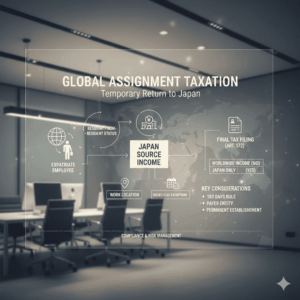Introduction
Dependency deduction for dependent relatives residing overseas Dependency deduction, spousal deduction, special spousal deduction, or disability deduction are applicable if certain conditions are met under Japanese tax law. Below, we will explain in detail the eligibility criteria for dependent deduction, required documents, and recent legal changes.
Subjects and conditions for deduction for dependents
In order for a dependent living overseas to be eligible for the dependent deduction, you need to meet the following conditions.
age requirements
Over 16 years old and under 30 years old: Eligible for dependent deduction.
30 years old or older and under 70 years old: Only eligible if certain conditions (study abroad, person with a disability, remittance of 380,000 yen or more) are met.
Over 70 years old: Eligible for dependent deduction.
Kinship
Dependent relatives must be spouses, blood relatives within the 6th degree of kinship, and relatives by marriage within the 3rd degree of kinship.
having one livelihood
In order to receive the dependent deduction, the filer is required to remit living and educational expenses to the dependent. Specifically, you need to remit more than 380,000 yen in that year.
Required documents
Family related documents
This refers to one of the following documents (1) or (2) that proves that a relative residing overseas is a relative of the person making the declaration.
(1) Documents issued by Japan or a local government, such as a copy of a family register, and a copy of a passport of a relative residing overseas.
(2) Documents issued by a foreign government or foreign local government (those that include the name, date of birth, and address or residence of a relative residing overseas). Examples include family register, birth certificate, and marriage certificate, etc. (original documents are required). If it is written in a foreign language, a Japanese translation is also required.
Remittance documents
The following documents certify that the person filing the tax return has made payments to each of his or her relatives residing overseas to cover their living expenses or educational expenses as necessary during the year.
(1) A document from a financial institution or a copy thereof, which certifies that a payment was made by the person making the declaration to a relative residing overseas through a foreign exchange transaction conducted by the financial institution.
(2) A so-called credit card issuing company document or a copy thereof, which indicates that a relative residing overseas purchased a product, etc. by presenting a card issued by the credit card issuing company. A document that clarifies that the amount of money equivalent to the purchase price, etc. has been received or will be received from the person making the declaration.
Specific examples of the above documents are as follows (original or photocopies are required for all).
Copy of foreign remittance request form (remittance made in that year)
Credit card statement (Credit card issued for use by a relative residing overseas, under which the person making the declaration has entered into a contract with the credit card issuer, and the resident is responsible for paying for the use of the card) This refers to the usage statement for the so-called family card.
Regarding recent legal reforms, there are new provisions that will apply from 2023 (Reiwa 5). Under this revision, relatives residing overseas who are over 30 years old and under 70 years old will, in principle, be excluded from the dependent deduction. However, as an exception, the dependent deduction will be applied in the following cases: (1) a person who no longer has an address or residence in Japan due to studying abroad, (2) a person with a disability, and (3) a person who has living expenses or educational expenses of 380,000 yen or more per year. person receiving
FAQs regarding deduction for dependents of relatives residing abroad
- Can non-resident relatives be eligible for dependent deduction?
Yes, it is possible if certain conditions are met. Conditions include that the non-resident relative is 16 years of age or older, and that you (the taxpayer) have remitted 380,000 yen or more for living or education expenses that year.
- What is the scope of relatives eligible for the dependent deduction?
Blood relatives within the 6th degree of kinship, spouses, or relatives by marriage within the 3rd degree of kinship are eligible.
- What documents are required to include non-resident relatives in the dependent deduction?
Documents related to relatives to prove the relationship between relatives, documents related to remittances to prove the fact of remittance. Depending on the situation, “documents such as a student visa” or “documents for remittance of 380,000 yen” may be required. For more information, please see the required documents above.
- What kind of documents are “remittance-related documents” specifically?
This includes documents related to remittances issued by financial institutions, usage statements issued by credit card issuers, and documents related to the transfer of electronic payment methods issued by business operators such as electronic payment methods. For more information, please see the remittance documents above.
- Do I need to submit remittance documents for all remittances?
If you make remittances to the same non-resident three or more times a year, you will be required to submit a statement with certain details and the first and last remittance documents of the year, and submit other remittance documents. Can be omitted. However, you must retain the omitted documents. In addition, in the case of dependents aged 30 to 70, documents must be prepared so that the total amount will be 380,000 yen or more.
- Are relatives living abroad for study purposes eligible for dependent deduction?
Relatives aged 30 to 70 who no longer have an address or residence in Japan due to studying abroad are eligible for dependent deduction. You will need to submit “documents related to relatives” and “documents such as study abroad visa.”










